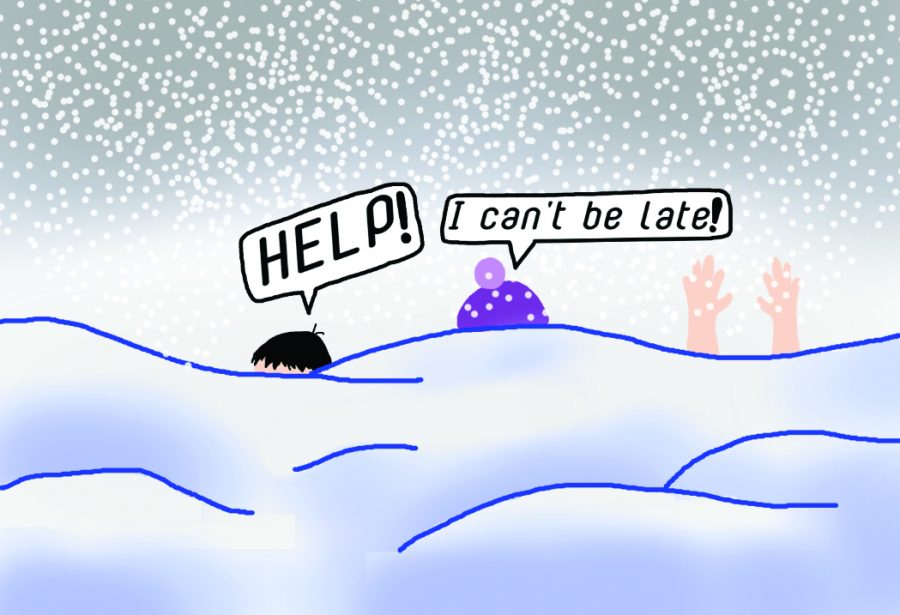Don’t expect canceled classes
Be prepared for a nasty winter, classes not being canceled and dealing with the general awful weather involving snow.
Severe weather is a common event during the winter in Pullman, but all students can do is prepare. Also the community must realize that just because classes are canceled does not mean campus is closed.
January 17, 2020
Consider a thick, soft blanket of snow. Drifts pile up between buildings like mounds of pure Colombian white, while students shuffle to and from class, bundled up in scarves. On Thompson Flats, kids are hitting the slopes on sleds or dining hall trays, while over at Olympia, some absolute Chad of a guy shredded the stair railing on skis. It was a sight to see. Even Facebook was not immune, with a virtual blizzard of controversy surrounding a snow-related article and its social media post that some found to be “offensive.”
Yes, everyone loves snow, and it sure is that time of year to expect it. But when we get hit with a slushy dump of white mayhem, like we did at the beginning of the week, it becomes less “idyllic wonderland” and more “Roald Amundsen’s mission to the South Pole” when you’re trying to get to a communication lecture. Flights were grounded, roads were closed and many students from out of town were unable to make it back safely, which puts WSU in a conundrum: to close school, or not?
“[WSU] never really closes, because we have a lot of operations that have to remain functional … buildings have to be powered, streets have to be cleaned, water and power have to be provided to the university,” Bill Gardner, WSU chief of police and associate vice president of public safety, said.
When school “closes,” it isn’t closed in the traditional sense. Classes are suspended, but the university still must function as it would on any other day.
“At times, we have to suspend certain parts of the operation, and classes might be one of those parts,” Gardner said.
The final decision on whether to close school, however, lies with WSU’s Office of the President.
“WSU has a Weather Triage Team, made up of representatives from Emergency Management, Facilities, Public Safety, Transportation and the President’s Office,” Sarah Blatner, coordinator for WSU’s Emergency Management Program, said in an email.
Blatner said that staff advisors from public safety, transportation and facilities, among others, advise the president’s office on whether classes should be suspended, based on weather conditions.
From that point, the president’s office determines whether WSU should remain open, or if it would be more conducive to the safety of students and staff for classes to be suspended.
“The Weather Triage Team takes into consideration 1) street, parking lot and sidewalk conditions on campus and the status of snow removal by WSU Facilities, 2) bus operations by Pullman Transit, 3) National Weather Service predictions and issued weather watches, alerts or warnings, and 4) road conditions on campus, the city of Pullman and the surrounding areas,” Blatner said.
Given all these factors, it’s easy to see how big and impactful of a decision needs to be made. No matter what, the snow is going to affect people, and the decision to close may be just as controversial as the decision to remain open. At the end of the day, administrators are working with the most possible information and trying to make the safest possible decision for WSU.
There’s also a difference between campus operational status and individual safety, Gardner said. While WSU may be functionally operational and classes may still be in session, an individual may make that decision to skip classes, simply because they don’t feel safe getting to school. Both decisions are valid, and both make sense, given the circumstances.
That said, with the beginning of the semester starting concurrently with a snowstorm, and so many out of town students stuck at airports or in their hometowns, WSU should have considered the higher numbers of students that would be missing classes and acted accordingly. On an individual level, professors and staff have been understanding, and have helped work with students who may have missed class due to weather. However, the impact of missing several days of class can still be a significant disadvantage for students, even if it is syllabus week.
All of this is not to disparage or critique the Office of Emergency Management or any of WSU’s administration behind the decision to keep the school open through bad weather; it’s merely intended to bring light to the situation that people are facing who cannot get back to school because of snow.
So, bundle up, Cougs! Invest in some ice cleats, because hitting an icy patch between classes is a great way to ruin your week. Make sure to watch the weather and give yourself extra time to get places. Get some hot soup from that ramen place we reviewed yesterday, if you need some winter comfort food. And to my roommate, who hit me with a snowball when I was reading “Watchmen”: I will get you back. That’s a vow.









